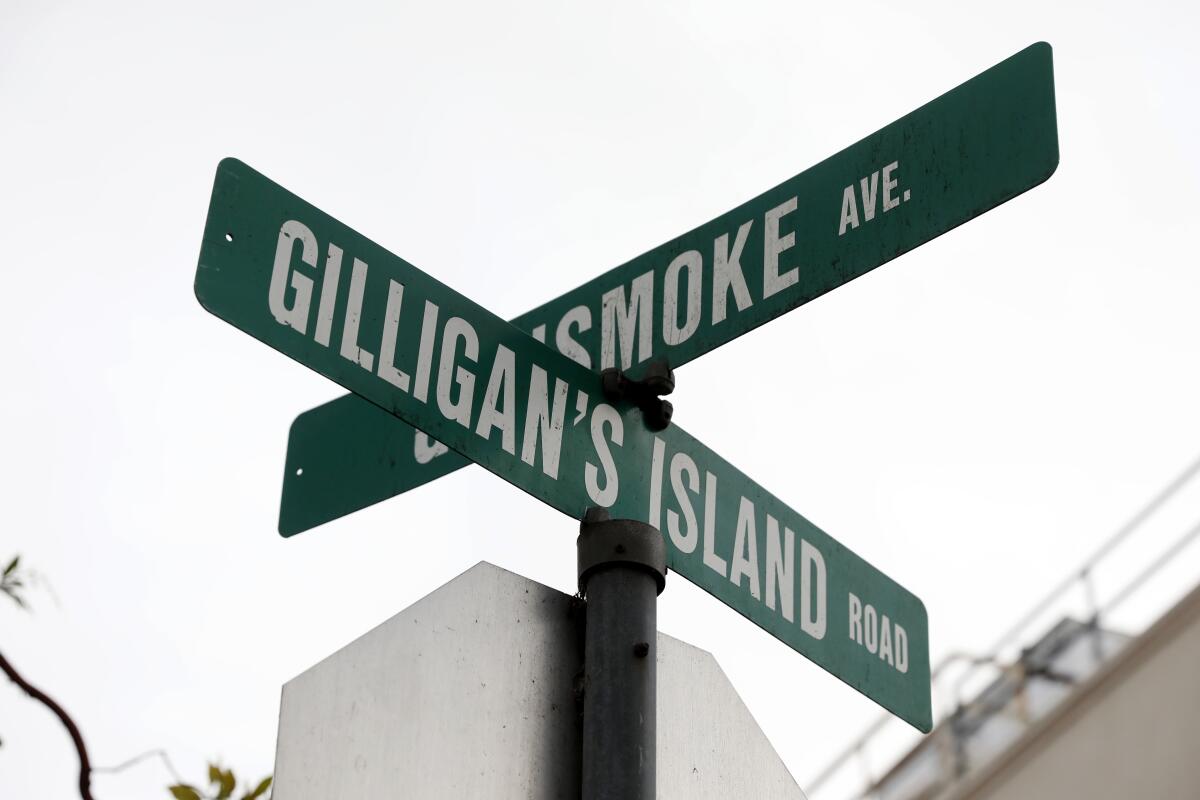Historic Radford Studio Center in default amid Hollywood slowdown
Radford Studio Center, the storied movie lot that gave Studio City its name, is in financial distress and is expected to be returned to lenders as declining film and television production racks the entertainment industry.
Formerly known as CBS Studio Center, the Los Angeles lot has been home to generations of landmark television shows including “Gunsmoke” and “Seinfeld.”
Hackman Capital Partners, one of the world’s largest independent studio operators, has defaulted on a $1.1-billion mortgage and investment bank Goldman is leading a takeover of the historic property. Bloomberg first reported on the news.

A street sign on the lot of the Radford Studio Center in Studio City.
(Gary Coronado / Los Angeles Times)
The move follows Hackman’s aggressive push in recent years to buy up studios to capitalize on anticipated growth, especially in the TV business. As of last year, the company had $10 billion in assets under management.
Founded by silent film comedy legend Mack Sennett in 1928, the lot became known as “Hit City” in the decades after World War II as popular TV shows such as “Leave It to Beaver,” “Gilligan’s Island,” “The Mary Tyler Moore Show,” “The Bob Newhart Show” and “Will & Grace” were made there.
Culver City-based Hackman Capital Partners and Square Mile Capital Management teamed up to buy the Radford Avenue property from ViacomCBS in 2021 with a winning bid of $1.85 billion after a competitive battle for the 55-acre studio beloved by the television industry.
At the time, the staggering price tag underscored the value — and scarcity — of TV soundstages in Los Angeles as content producers scrambled for space to shoot TV shows and movies to stock their streaming services. It was one of the largest ever real estate transactions for a TV studio complex in Los Angeles.

A photo of actors John Wayne, center, Max Terhune, left, and Ray Corrigan in the movie “Three Texas Steers,” filmed in 1939, hangs on a wall at Radford Studio Center.
(Gary Coronado / Los Angeles Times)
Since then, production has substantially declined. L.A. continues to battle the loss of production to other states and countries, as well as the continued effects on the industry of the pandemic and the 2023 dual writers’ and actors’ strikes. Cutbacks in spending at the major studios after a surge in streaming-fueled TV production have further damped film activity in Southern California.
Total film and television shoot days for 2025 dropped 16.1% compared with the previous year, according to a recent report. The production decline has left many in Hollywood without work for months or even years.
Last year’s 19,694 shoot days was the lowest total since 2020, according to the nonprofit FilmLA, which tracks filming in the Greater L.A. area. In 2024, the total was 23,480 shoot days.
“While the year-end numbers are disappointing, they are not unexpected,” Philip Sokoloski, spokesman for FilmLA, said in a statement. “Although our overall numbers remain low, there are dozens of incentivized projects that have yet to begin filming.”
Financial incentives to film in California are offered through the state’s revamped film and television tax credit program approved by state legislators and signed by Gov. Gavin Newsom last year. The new program now has a cap of $750 million, up from $330 million.
“We are continuing to work with the Radford lenders on a path forward for this asset,” Hackman Capital spokesman Nathan Miller said in a statement. “This is a challenging time for all suppliers and independent studio owners and operators in the U.S.”

Republic Avenue on the lot of Radford Studio Center in 2023.
(Gary Coronado / Los Angeles Times)
Miller added: “We have substantial capital behind us, hold 50% of our assets without debt, and remain geographically diverse, with 55% of our studios outside the U.S. This will help us to navigate through these troubled waters.”
Among its 19 properties are studios in England, Ireland, Scotland and Canada.
A sticking point in Radford’s financial challenges is MBS Group, which provides lighting and other production services for shooting locations and was acquired by Hackman Capital in 2019. In the last year, Bloomberg said, MBS broke away from Hackman while continuing to manage many of the firm’s properties, including Radford.
In a December letter to investors, Hackman said MBS had thwarted its efforts to restructure the loan, spurring its decision to return the property to lenders, Bloomberg said.
“MBS delivered a proposal requiring significant adverse changes to the Radford equipment rental agreement that would undermine the projected economics of the loan restructuring,” Hackman said in the letter.
Hackman is considered Hollywood’s largest landlord.
In 2019, Hackman Capital purchased CBS’ other sprawling complex in Los Angeles — the 25-acre Television City adjacent to the Original Farmers Market and the Grove — for $750 million.
Hackman Capital also owns the Manhattan Beach Studios Media Campus and the historic Culver Studios in Culver City, where “Gone With the Wind,” “Rebecca” and “E.T.” were filmed. Amazon Studios now operates from the site.
Times staff writer Samantha Masunaga contributed to this report.
